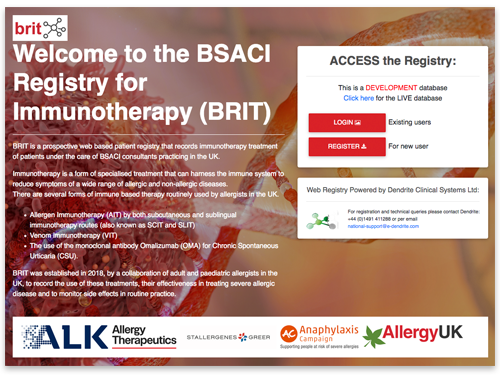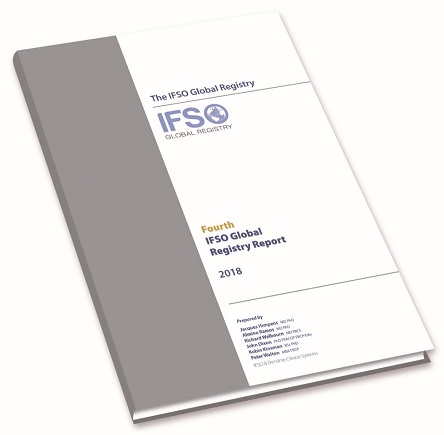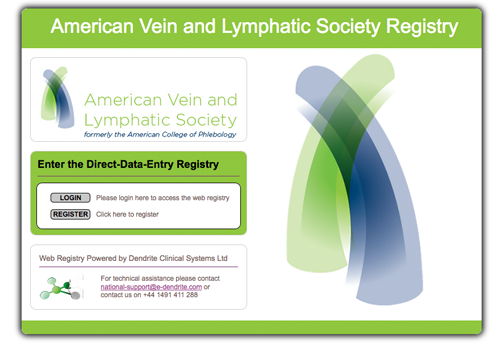Dendrite and BSACI launch BRIT immunotherapy registry
 Dendrite Clinical Systems and the British Society for Allergy & Clinical Immunology (BSACI) have launched the British Registry for Immunotherapy (BRIT), a web-based patient registry that records immunotherapy treatment of patients under the care of BSACI consultants practicing in the UK.
Dendrite Clinical Systems and the British Society for Allergy & Clinical Immunology (BSACI) have launched the British Registry for Immunotherapy (BRIT), a web-based patient registry that records immunotherapy treatment of patients under the care of BSACI consultants practicing in the UK.
“We are delighted to launch the first national immunotherapy registry in the UK,” said Dr peter Walton, managing Director of Dendrite Clinical Systems. “By recording each and every serious adverse event during immunotherapy treatment, the BSACI we will be able to monitor the efficacy of immunotherapy enabling the BSACI to guide commissioning of services and guideline development.”
BRIT is a secure web-based registry that can record the use of Allergen Immunotherapy (AIT) by both subcutaneous and sublingual immunotherapy routes (also known as SCIT and SLIT). By venom immunotherapy (VIT) and the use of the monoclonal antibody Omalizumab (OMA) for Chronic Spontaneous Urticaria (CSU) in patients under the care of BSACI registered consultants. It will help consultants keep track of their patients and monitor their response to treatment by using email PROM reported directly by participants. It will also monitor safety and access to treatment around the UK.
To better understand what the current practises are in the UK, an online registry was developed by Dendrite using their “Intellect Web” software. This allows consultants to enter patient data online, using a range of modern html-5 compatible web browsers, without the need to install additional software or perform any complex system configurations.
The registry is open for all consultant BSACI members to register their practice(s) for both adult and paediatric patients. Additional healthcare professionals in the practice can register as users under the same practice in order to input data into the registry.
The registry is funded by unrestricted grants from three companies: AlK Abello, Allergy Therapeutics and Stallergenes.
 Dendrite Clinical Systems is pleased to announce the prestigious journal, Obesity Surgery, has published a paper highlighting international bariatric surgery practice from the 4th Dendrite/IFSO Global Registry Report. The paper, ‘Bariatric Surgery Worldwide: Baseline Demographic Description and One-Year Outcomes from the Fourth Dendrite/IFSO Global Registry Report 2018’, (Himpens et al. Obesity Surgery. March 2019.
Dendrite Clinical Systems is pleased to announce the prestigious journal, Obesity Surgery, has published a paper highlighting international bariatric surgery practice from the 4th Dendrite/IFSO Global Registry Report. The paper, ‘Bariatric Surgery Worldwide: Baseline Demographic Description and One-Year Outcomes from the Fourth Dendrite/IFSO Global Registry Report 2018’, (Himpens et al. Obesity Surgery. March 2019. Dendrite Clinical Systems and The State of Kuwait Ministry of Health,
Dendrite Clinical Systems and The State of Kuwait Ministry of Health, Dendrite Clinical Systems and The American Vein and Lymphatic Society (formerly the American College of Phlebology) are delighted to announce the launch of the American Vein and Lymphatic Society Registry - a ‘real-time’ clinical database that will identify practice patterns for venous and lymphatic disease diagnosis and treatment across North America.
Dendrite Clinical Systems and The American Vein and Lymphatic Society (formerly the American College of Phlebology) are delighted to announce the launch of the American Vein and Lymphatic Society Registry - a ‘real-time’ clinical database that will identify practice patterns for venous and lymphatic disease diagnosis and treatment across North America. Dendrite Clinical Systems and the Society for Cardiothoracic Surgery in the UK are pleased to announce the SCTS Conference News 2019 newspaper is now available to view/download. This is the fourth successive year Dendrite has published the newspaper on behalf of the SCTS. The newspaper reports a multitude of presentations from the meeting including the latest and the best information on new technologies and techniques in cardio-thoracic surgery.
Dendrite Clinical Systems and the Society for Cardiothoracic Surgery in the UK are pleased to announce the SCTS Conference News 2019 newspaper is now available to view/download. This is the fourth successive year Dendrite has published the newspaper on behalf of the SCTS. The newspaper reports a multitude of presentations from the meeting including the latest and the best information on new technologies and techniques in cardio-thoracic surgery.  Dendrite Clinical Systems, the publisher of Bariatric News, is pleased to announce issue 39 of the newspaper is now available to view/download. The newspaper reports on research, technology, events and policy in the bariatric specialty, the latest clinical studies, policy changes and product news, the latest meetings and events, interviews prominent bariatric experts, and host debates between specialists on controversial topics.
Dendrite Clinical Systems, the publisher of Bariatric News, is pleased to announce issue 39 of the newspaper is now available to view/download. The newspaper reports on research, technology, events and policy in the bariatric specialty, the latest clinical studies, policy changes and product news, the latest meetings and events, interviews prominent bariatric experts, and host debates between specialists on controversial topics. Dendrite Clinical Systems in pleased to announce its clinical database system has been selected to collect, record and analyse data from the Obesity Research Biobank Syndicate (ORBiS) Registry. ORBiS is a network of multidisciplinary professionals working towards a common goal: to gain novel insights into obesity and weight management, and help translate these findings into improved patient care.
Dendrite Clinical Systems in pleased to announce its clinical database system has been selected to collect, record and analyse data from the Obesity Research Biobank Syndicate (ORBiS) Registry. ORBiS is a network of multidisciplinary professionals working towards a common goal: to gain novel insights into obesity and weight management, and help translate these findings into improved patient care. 


